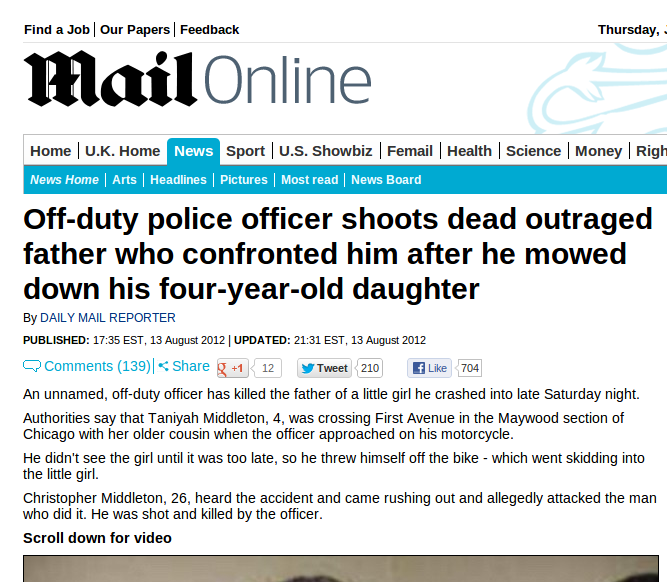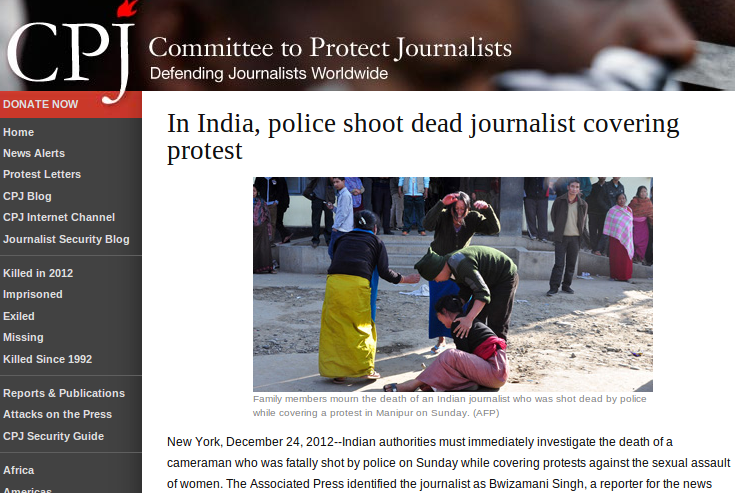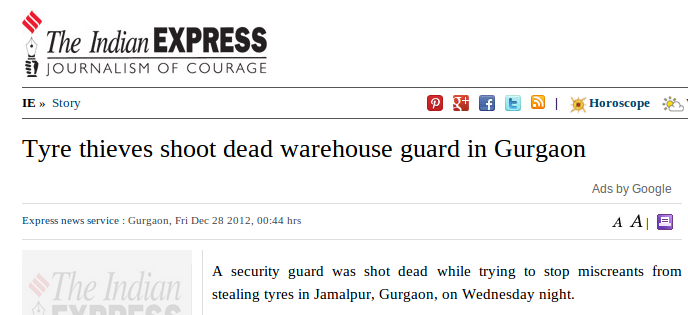Shooting dead people
« previous post | next post »
M.P. sent in her collection of headlines about shooting dead people.
I'm sure that the grammar is actually correct, when it comes to a person being shot dead and that person's life is thus ended. However, no matter how correct it could be, it still reads awkwardly (personally, I get visions of zombies).
These are just a few of the examples I found.
Is this a new trend? An old trend that came back from the dead?
One example: "Off-duty police officer shoots dead outraged father who confronted him after he mowed down his four-year-old daughter"
(We'll leave for another time the ambiguities of pronoun reference in "… him … he … his".)
Shooting dead peole is an old story — Geoff Pullum explained the syntax of such headlines in "Why shoot the dead ones?", 10/17/2010:
… this is what linguists call a "Heavy NP Shift" construction: when a direct object is long, complex, or in some way heavy with pragmatic import, it is permissible to place it last in the clause, after everything else in the verb phrase. For example:
The report stripped [ ] bare of its wrapping of euphemism the sordid reality of what this disgusting man had actually been doing.
The empty brackets show where the direct object could have gone, and would obligatorily have gone if it were short:
The report stripped his story bare of its wrapping of euphemism.
That's a much better style choice than the very dubious alternative:
?The report stripped bare of its wrapping of euphemism his story.
And certainly "[the] outraged father who confronted him after he mowed down his four-year-old daughter" counts as a heavy NP. If the object were just "[the] father", we'd have
… shoots [the] father dead
as the appropriate construction; but in
… shoots [the] outraged father who confronted him after he mowed down his four-year-old daughter dead
"dead" is too far away from "shoots" (and maybe too close to "daughter") to be clear. So it's normal to shift the object-phrase past "dead":
… shoots dead [the] outraged father who confronted him after he mowed down his four-year-old daughter
But now another potential problem is created by the headlinese convention of omitting articles, because now we've got
… shoots dead outraged father …
Sometimes it's worse:
Here the normal order is
Criminals shoot [a] man dead in [the] presence of [a] Bihar official
This headline would be clear (and short) enough if left like that, with all the articles intact. The object ("[a] man") is far from being heavy enough to shift — and if shifted, should probably go all the way past the locative adjunct "in [the] presence of [a] Bihar official". Shift the object and omit the articles, and the result strikes me as ungrammatical — except maybe in headlinese:
Criminals shoot dead man in presence of Bihar official.
This one's got exactly the same problem:
Here's one that seem ungrammatical for another reason:
"Sister, 19, accidentally shoots dead brother in the head while posing with gun for Facebook picture"
My intuition, for what little it's worth, says that you can shoot someone dead, and you can shoot someone in the head, but you can't shoot them dead in the head. But even if it's (grammatically) OK to shoot your brother dead in the dead, I'm pretty sure that you can't shoot dead your brother in the head.
The rest of these are grammatical headlinese, though potentially confusing:
"Afghan policewoman shoots dead US military adviser"
"Unknown Gunman Shoots Dead Teenage Kunduz Girl"
And onward:













Ginger Yellow said,
January 3, 2013 @ 5:31 am
Syntax aside, those Mail Online/AP stories have ridiculously long headlines. Seems weird to me, given that people would have no incentive to click on the stories – everything's right there in the headline. The actual copy is more or less superfluous.
lemur said,
January 3, 2013 @ 6:32 am
Ah, if only this were Sprachenprotokollieren. The German tongue has both "schiessen", to shoot, and "erschiessen", to shoot dead. But there is, sadly, no word for "erschiessen" in English. So headline-writers have to put together these crazy-looking examples. If you image "shoot dead" in some of the examples above as a single word, meaning "fatally shoot", then even the one about shooting dead one's brother in the head works just fine.
AlexB said,
January 3, 2013 @ 6:52 am
Mind you, even when you're dead, you can still sue
http://www.dailymail.co.uk/news/article-2187835/Albert-Covarrubias-17-year-old-girl-sues-police-force-explicit-affair-officer-shot.html
Andrew Tattersall said,
January 3, 2013 @ 7:00 am
Ginger Yellow headlines work differently for the Internet, certainly for the Mail part, where they believe getting as many words in the headline gives more keywords and boosts the position of the article in searches for one of the terms, driving traffic to their website. Least I think that's their theory. I don't know enough to know if it works.
richardelguru said,
January 3, 2013 @ 7:06 am
I think the lemur has it. Changing "shoot dead" to "fatally sho[o]t" works perfectly in all of those cases (bit ugly following 'accidentally' though).
And I won't even try to prove that 'no word for "erschiessen" in English' means that English speakers are incapable the act.
Tanja S said,
January 3, 2013 @ 7:09 am
In Finnish, we do it with cases: shoots someone_accusative = dead, shoots someone_partitive = not dead.
Victor Mair said,
January 3, 2013 @ 7:32 am
In Mandarin grammar, we call this a resultative complement: you SHOOT someone with the result that the person is DEAD — dǎ sǐ 打死 ("shoot dead", i.e., "kill"). Such constructions are very common in Sinitic languages.
David Morris said,
January 3, 2013 @ 8:12 am
"I shoot dead people"!
Maureen said,
January 3, 2013 @ 8:21 am
"Off-duty police officer mows down little girl, then shoots her father dead"
It's not that hard.
Alan Gunn said,
January 3, 2013 @ 8:24 am
If newspapers used articles in headlines the problem would be easily solved: "shoots dead a man …." avoids the zombie suggestion.
Jeff Carney said,
January 3, 2013 @ 8:47 am
With a nod to lemur, what does it say about anglophones that we have no word for "shoot dead"? A hypothetical outsider might imagine that we are unaccustomed to gun violence . . .
Narmitaj said,
January 3, 2013 @ 8:53 am
@AlexB – the headline and much else is indeed confusing in the linked-to article, but in fact there is no "person sues after his or her own death". There's a dead policeman, shot by his colleague/partner/best man. There's an alive young woman who is suing the police and the policeman's widow and estate.
Brett said,
January 3, 2013 @ 8:54 am
@Alan Gunn: This is a point that has long puzzled me. During my brief time writing news heds, my policy was to include an article if it enhanced clarity. However, it appears that many editors or publications feel that omitting articles in headlines is not merely allowed or preferred, but mandatory. I suppose this might be a well considered policy designed to give a publications heds a consistent and perhaps distinctive style, but that doesn't really seem likely.
Ginger Yellow said,
January 3, 2013 @ 9:46 am
Ginger Yellow headlines work differently for the Internet, certainly for the Mail part, where they believe getting as many words in the headline gives more keywords and boosts the position of the article in searches for one of the terms, driving traffic to their website. Least I think that's their theory. I don't know enough to know if it works.
Yes, there's clearly something like that driving the style, and as an online journo myself I understand the difference from print. But they seem to be going overboard – the entire story is told in the headline, so it would seem to do the opposite of driving traffic. It's all very well being the first result in a search, but if you leave no reason to click through to the page it seems counterpoductive.
Cameron said,
January 3, 2013 @ 10:09 am
By analogy with German erschiessen many Latin dictionaries list a verb exballisto, exballistare; in my dictionary this is defined as "to finish off with the ballista". Presumably this was a very handy word to have around in certain contexts.
Sarah J said,
January 3, 2013 @ 10:11 am
My first awareness of this construction was in 2007, when I saw a Reuters headline on my Yahoo! news page (in the U.K. and Ireland Top Stories area): "Police shoot dead old man." It caught my eye, and I did some quick searching, finding that there were about 9500 google hits for "police shoot dead" and about 800 for "police shoot * dead." (I wrote this down at the time — I don't actually remember the details from 5+ years ago!) Most of the hits were from ex-US sources. This still appears to be the case.
Does this mean that the US is unprepared for the coming zombie apocalypse??
Charles Bernstein said,
January 3, 2013 @ 10:12 am
Brings to me poet Lew Welsh's celebrated ad:
Raid kills bugs dead.
Mr Fnortner said,
January 3, 2013 @ 10:29 am
To meet the need of a word to name execution by electricity, electrocute was coined. Now it has come to mean any death by electricity, intentional or not. Perhaps a word to mean death by firearm would be ballisticute. Not euphonious, I agree, but I imagine electrocute was a mouthful at first, too, Sadly, it's not headline-short, but it may fit in the same space as shoot/shot dead.
Robert Coren said,
January 3, 2013 @ 10:45 am
I see that the headlinese construction can leak into the copy, as in the "Sister, 19…" example: "A 19-year-old woman accidentally shot dead her brother while posing…" There's no good reason not to have written "accidentally shot her brother dead" in this instance.
Ellen K. said,
January 3, 2013 @ 10:58 am
Robert Coren, I don't think you're example is headlinese, nor ambiguous. What makes the construction headlinese is the lack of articles (a/an or the). There's nothing missing here. The word "her" serves the same way as an/a/the would; there's a clear difference between "shot dead her brother" and "shot her dead brother", thus it doesn't have the ambiguity that the headlines have.
naddy said,
January 3, 2013 @ 12:06 pm
Apart from basic schießen and erschießen German offers further useful prefix combinations:
abschießen — shoot down, e.g. a plane
anschießen — shoot and injure
beschießen — shoot at, usually with artillery
verschießen — shoot until you run out (of ammo)
zerschießen — destroy by shooting
and probably others I can't think of right now.
Robert Coren said,
January 3, 2013 @ 1:09 pm
@Ellen K.: I agree that it's not strictly headlinese, nor ambiguous, but it's certainly awkward, and probably wouldn't have been written that way if the construction weren't already in the headline.
Lane said,
January 3, 2013 @ 1:41 pm
The other lesson of this is that it's akin to what Pullum calls "nerdview". The editors of the story sign off on the headline and art and all, but it's never looked at by someone who is completely ignorant of the content of the story. If you know what the story is about, shooting zombies will never occur to you; the brain ignores the wrong garden path.
So it's good practice to get a sympathetic and intelligent but otherwise clueless-about-the-context last pair of eyes (for just about everything). This probably happens a lot less on wires and at newspapers, where time is tight.
Bassman said,
January 3, 2013 @ 1:56 pm
In agreement with Sarah J, it seems that all of these headlines are pulled from publications where one might expect British English (as opposed to American English) to dominate. Could it be that the construction "shoot dead [D.O.]" is preferred in British English? Or, perhaps that 'shoot dead' is treated similarly to an infinitive, never to be split?
Brett said,
January 3, 2013 @ 3:32 pm
@Mr Fnortner: Except that "electrocute" does not (to me) carry any implication of fatality, merely severity. While it was coined to refer to a fatal shock, people routinely talk about "electrocution" after any nasty jolt, if a merely painful but not injurious one. I certainly use the word that way, and there are numerous examples in the media as well.
pj said,
January 3, 2013 @ 3:41 pm
@Bassman, nope, sorry, "he shot his brother dead" is just fine in non-headline British English. Much more normal, to my ears, than "he shot dead his brother" – it's only when the NP is 'heavy', as discussed in the post, that it's natural to bring 'dead' forward. With the 'lightest' possible object, a pronoun, 'splitting' is compulsory: "he shot her dead" is non-negotiable.
Theophylact said,
January 3, 2013 @ 3:58 pm
"Shoots to death" works fine, though, at the cost of three additional characters (two letters, one space).
Oliver Neukum said,
January 3, 2013 @ 4:38 pm
German has those prefixes for most verbs, so you can hardly draw any conclusions from that.
Ken Brown said,
January 3, 2013 @ 5:01 pm
Isn't the English for "exballistare"/"ballisticute" "gun down"?
Works for artillery as well as firearms. A ballista was field artillery rather than a one-man weapon.
J.W. Brewer said,
January 3, 2013 @ 5:22 pm
While perhaps not as prolific as German, English has at least "shoot up" and "shoot down" as phrasal verbs with both "literal" meanings involving gunplay and various extended/metaphorical meanings (perhaps the heroin sense of "shoot up" has something to do with the vaccination sense of "shot" given the commonality of hypodermic needles, even though the verb "shoot" is not typically used in the latter context?). Also "shoot out" (applying the standard test for phrasal-verbness you can shoot the lights out, but you can't shoot the window through, at least in my idiolect), and perhaps others not immediately springing to my mind.
Rubrick said,
January 3, 2013 @ 5:38 pm
@myl: "But now another potential problem is created by the headlinese convention of omitting articles"
Curious that articles always have headlines, but headlines rarely have articles.
David Morris said,
January 3, 2013 @ 6:26 pm
Does "police shoot man" mean fatally or non-fatally? I would assume non-fatally until I read otherwise. Therefore we need a word meaning "fatally", which might, indeed, be "fatally" – "police fatally shoot man". If we use "dead", then the two places to put it are the ambiguous "police shoot dead man", or the unambiguous "police shoot man dead".
chris said,
January 3, 2013 @ 6:49 pm
Well, there's "fatally shoot" or "shoot and kill"; although the latter involves one extra word, it's generally unambiguously clear. (Nobody expects it to mean that you shoot them nonfatally, then poison, stab, and club them unconscious and throw them in the river.)
With a nod to lemur, what does it say about anglophones that we have no word for "shoot dead"? A hypothetical outsider might imagine that we are unaccustomed to gun violence
IMO, it means very little; we have set phrases (even several of them), indicating our familiarity with the subject matter. The fact that they're multiple words rather than one is of little significance. All of the German compounds can be expressed in English without any difficulty; English is just a language that favors set phrases over compound words (although some of them do eventually fuse, of course).
It's not like we were trying to say "ocelot" or "avocado" and had to resort to a modification of a word borrowed from another language spoken by a people more familiar with the thing in question. (Or worse, borrow a phrase originally cobbled together by speakers of another language when they first encountered the thing and subsequently fused into a compound word, like "hippopotamus".)
EndlessWaves said,
January 3, 2013 @ 7:29 pm
"Does "police shoot man" mean fatally or non-fatally?"
Neither, one or the other may be more likely depending on context – you'd expect it to be fatal if that was the front page headline but probably non-fatal if you found it in small type towards the end.
Ethan Cheng said,
January 3, 2013 @ 7:40 pm
"The Police Shoot People Dead."
There are several ideas occurring in my mind.
In English, some constructions can allow adjective to be a post-modifier as a resultative complement. For example, I painted the wall red.
However, in pedagogical aspect, EFL students at intermediate level or below may have hard time acquiring this usage. Is there any relevant article the comment critics can tell me to read on?
Second, the sentences as the headline showed look like a garden path sentence, even though I just googled what a "garden path sentence" is yesterday. But can I categorize the exemplar sentence as this kind of phenomenon?
pj said,
January 4, 2013 @ 5:52 am
To my mind there's a distinction between 'shoot dead' and 'fatally shoot'. If someone is 'shot dead' I understand them to have expired extremely promptly upon being shot; if they're 'fatally shot' it implies the shooting and the death conceptualised as temporally plainly distinct events, with the injuries caused by the shooting leading to death at some later time.
NotJohn said,
January 4, 2013 @ 8:25 am
@Jeff CarneyWith a nod to lemur, what does it say about anglophones that we have no word for "shoot dead"? A hypothetical outsider might imagine that we are unaccustomed to gun violence…I assume it means that anglophones are really, really bad shots
annie morgan said,
January 4, 2013 @ 10:57 am
Funnily fascinating (and I laughed aloud at NotJohn's assumption) – but I need to ask, are you related to Anatoly Lieberman of OUP Etymological fame? Now how to figure out the way to find more of your articles on a regular basis…
Jeff Carney said,
January 4, 2013 @ 2:29 pm
@NotJohn
Thank you for noticing my attempt at humor. Chris seems to have taken me quite literally and wasted some time as a result. If anyone else cares: yes, I am aware of the "has no word for X" trope. I'm an LL regular since at least 2008.
a George said,
January 4, 2013 @ 7:36 pm
I can't understand this fascination with firearms. As if their use were the important headline message. The word "kills" or "killed" would have served just as well as an appetizer. And since it is invariably people, not bugs, "dead" is superfluous.
Chris Davis said,
January 5, 2013 @ 3:36 am
To those commenters wanting to know more about the construction under discussion: A good article about resultative constructions like the "shoot dead" one in this post, including a lot of data from German and some cross-linguistic considerations, can be found in Angelika Kratzer's paper, "Building Resultatives", which can be retrieved from the Semantics Archive at this link:
http://semanticsarchive.net/Archive/GY4ZThjZ/Building%20Resultatives.pdf
I’ve got your missing links right here (5 January 2013) – Phenomena: Not Exactly Rocket Science said,
January 5, 2013 @ 11:59 am
[…] "Shooting dead people" […]
Mar Rojo said,
January 7, 2013 @ 6:52 pm
Police shoot umdead man.
Mar Rojo said,
January 7, 2013 @ 6:57 pm
Diminishing or increasing ambiguity?
Police shoot dead man.
Police shoot dead creature.
Hunters shoot dead creature.
David Walker said,
January 10, 2013 @ 2:31 pm
Unfortunately, shooting has "erupted" today in California. At this story, http://www.reuters.com/article/2013/01/10/us-usa-shooting-california-idUSBRE90910H20130110, the headline says "Shooting erupts" and the story says "Gunfire erupted".
Shooting and gunfire don't just "erupt"; that makes it sound like it's a spontaneous happening (sort of like a volcano, although that isn't really spontaneous either). I hate the use of the word "erupts" in connection with violence.
Daz said,
January 11, 2013 @ 8:38 am
Of course the phrase "shoots dead son" is entirely ambiguous and, at least in the U.S., sounds above all as though the shooter is wasting a perfectly good bullet for no reason. (Just kidding.)
But in the U.S. this would be phrased "shoots son dead" and the meaning becomes clear-cut. I also suspect the British headline writer's superiors weren't too happy about it, either.
This Week’s Language Blog Roundup: Passings, words of the year, foreign words | Wordnik said,
January 14, 2013 @ 12:27 pm
[…] Miserables, and Mark Liberman considered the malapropism, shunned their noses at us; the unclear shooting dead people; and grammar on […]
Link love: language (50) « Sentence first said,
January 22, 2013 @ 4:08 pm
[…] Shooting dead people in ambiguous headlines. […]
Michael LaRocca said,
January 22, 2013 @ 4:22 pm
Wasn't there a movie where Haley Joel Osment said, "I shoot dead people. All the time."? Or am I confused again?
Shell said,
May 26, 2014 @ 5:10 pm
In addition to resulting in rather comical sentence construction, "shot dead" is gramatically incorrect.
“Shot” is a verb, so it requires an adverb as a descriptor. So, you might use “fatally shot”, or “shot and killed”, but not “shot dead”. "Dead" is an adjective, and is appropriately used to describe a noun. For example, "There is a dead man floating in the swimming pool."